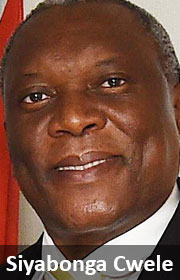 The South African government has identified the ICT industry as one of the key sectors that will facilitate faster economic growth and radically transform our society.
The South African government has identified the ICT industry as one of the key sectors that will facilitate faster economic growth and radically transform our society.
Last week, cabinet approved the national integrated ICT policy white paper, giving the sector the tools it needs to craft a modern society that embraces and uses technology to be more competitive while being inclusive.
It is both our response to the way our world is organised through the convergence of technologies and our springboard into the future in which we have to cope with the challenges brought by the “fourth industrial revolution”.
The white paper introduces certainty to the market because it is focused on the long term, with a time span of up to 10 years, with regular reviews planned.
It is an integrated policy that takes into account the convergence of technologies because the way people communicate, interact and transact has changed. For example, many people use the online service to manage their tax affairs. And this has led to growing demand for broadband access and services.
The numbers of people who joined the calls to lower the cost of communication through the #datamustfall campaign is a perfect illustration of why we need to modernise the sector and position it to radically transform our society.
The ICT policy white paper has principles that we believe will contribute to the lowering of the costs for investors and ultimately consumers.
Operators have flagged the cost of rolling out infrastructure as one of the biggest contributors to high prices. There are two ways in which this policy addresses this challenge.
Firstly, it introduces the open-access policy, which allows access to existing and future networks by all, including by new entrants and small, medium and micro enterprises. Open access networks refer to the principle of providing effective wholesale access to network infrastructure or services at fair and reasonable prices and on a transparent and non-discriminatory basis.
This policy aspect can reduce the uneconomic duplication of fixed and mobile network infrastructure roll-out and minimise the cost of extending these to reach the entire country. The current structure of competition on infrastructure favours the roll-out of infrastructure in urban areas. This infrastructure does not extend to reach people in rural areas. In essence, we believe that competition in the telecoms market has to be on services, not on infrastructure.
Finding cost-efficient ways of rolling out infrastructure is crucial because the United Nation’s Broadband Commission says it will be harder and more expensive to connect the four billion citizens who are offline.
The open-access policy will afford more players the opportunity to participate meaningfully in the market because the barriers to entry would be lower and that their entry will give consumers choice — at affordable prices.
Another cost pusher of ICT infrastructure is the complexity of approval processes and the resultant costs.
The rapid deployment policy contained in the white paper will streamline the permissions and access by the network operators so as to enable a faster and cheaper roll-out of services.
The ICT policy white paper takes into account the constitutional principles of inclusivity and non-discrimination. It introduces measures to encourage the uptake and usage of ICT. For example, it streamlines and consolidates government structures, outlines government priorities in terms of delivering services through modern ICT. A universal funding strategy is outlined, with the digital development fund being established to collect industry contributions and grants to support universal services and access.

The inclusion and participation of people who are currently not connected to the Internet will help compensate for shrinking revenues amongst infrastructure and services companies.
Also, South Africans are increasingly consuming ICT gadgets while the economy is losing electronics manufacturing jobs. The policy introduces measures to localise and participate in the Internet economy. This will help to create jobs of the future.
In the coming weeks and months, I look forward to continuous robust engagements with South Africans as we start to enact or amend the laws that will give effect to this ICT policy.
The National Development Plan (NDP) foresees ICT underpinning “the development of a dynamic and connected information society and a vibrant knowledge economy that is inclusive and prosperous” by year 2030.
This is our best shot at creating laws that would prepare us for meaningful participation in the digital economy and knowledge society as envisaged in the NDP.
- Siyabonga Cwele is the minister of telecommunications & postal services




